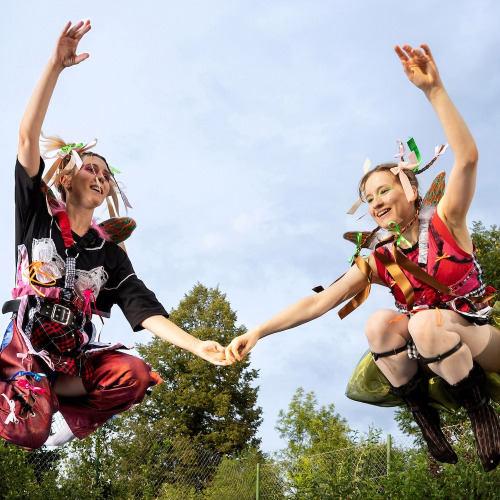
GUSTAV & ELECTRIC INDIGO & DJ TRICK- C & MISS HOUSE WIFE
GUSTAV (Austria) "My father always wanted a boy,” explains
Eva Jantschitsch, “so he used to call me
‘Gustav’ until I was at least three.” The
26-year-old Austrian fine arts student
seems to translate anarchist praxis into audacious - yet
intimate - synth rock. Though actually, there is a lot
more to it. Unlike most post-Le Tigre satellites, whether
rhyming along to Hakim Bey, droning against patriarchy,
or recalling Carlo Guliani (who was killed at the GB
conference in Genoa), Jantschitsch’s approach is both
non-reactionary and subtly humorous. Indeed, her sunny,
heavily accented voice, wrapped in a digital orchestral
sound, often cracks as if she can’t help laughing,
welled up with the belief that we can ultimately make
a so-called ‘better world’. “Let’s keep it blurred and
kitschy," she jokes.
To make it clear: we are dealing with a talented singer
and producer used to great many performances in
various groups and collectives in which various members
both compose and play their music. Unfortunately,
however, the ‘female singer’ epithet reduces Eva
Jantschitsch to a mere vocalist, something which this
artist does not hold with at all. The Gustav project thus
stems from an emancipatory need to exist as a complete
authoress. At the same time, the male name of the
project neutralises the original moment of a female at
the forefront of the predominantly male backdrop that
is music scene/industry, which in itself provides the
possibility for different scenarios.
The electronic music scene has an overwhelmingly masculine
countenance: organisers, writers, sound designers,
journalists, reviewers etc., are for the most part men.
This exerts a strong influence on creative work and
modes of expression, despite the possibilities and abilities
that allow the female artist to join such a dominancycharacterised
context. Therefore Jantschitsch believes that
events, such as Ladyfest as well as other cities of women,
are unconditionally essential as projects that revolt
against the general practise of the Cultural Industry.
“Save the whales, overthrow the system,” urges Gustav,
laying out the path towards a non-consumptive way of
life. By citing Brian Eno, Talking Heads, Nina Simone,
Tom Waits and Laurie Anderson as musical influences,
she differs from contemporary IDM musicians,
and her aired intimate/active synth draws out an
authentic canvas on which both activist as well
as humorously ironic colours are painted.
Radically individual, neither Eva Jantschitsch
nor Gustav invariably triggers negotiations with
connotations of the notion, the idea, and the
image of ‘woman’ when she becomes an image
on stage or in the media. It is an extremely
schizophrenic position when Gustav is repeatedly
thrown back to ‘being-object’ despite her
intense ‘becoming-subject’. “As a woman on the
stage I am merely a concept....”
ELECTRIC INDIGO (Austria) “To call Electric Indigo the most important
woman in the Austrian electronic scene would
be an insult,” wrote Sven Gaechter, editor-in-chief
of Profil magazine; in fact this is true from
several aspects – the female, electronic as well
as international. Susanne Kirchmayer – a DJ and
producer who has been renowned for nearly
two decades – has her roots in the Viennese jazz
and funk sets of the late ‘80s, but she was soon
overwhelmed by the power of Detroit and Chicago techno obscurity,
ritualism and machinery; to put it in her own words: “the DJ-update
of the man-machine music idea” – human funkiness and the mechanics
of the machine.
One of the significant turning points in Susanne Kirchmayr’s career is
related to the legendary Berlin record store Hard Wax, where between
1993 and 1996 she was responsible for purchasing and communication.
The late ‘90s saw the establishment of indigo:inc, a server for extended
party experiences and multimedia events; this simultaneously led to the
female:pressure project, a significant contribution to the establishment
of women as DJs and producers. Female:pressure is an international
database and central on-line info point of female artists, most of whom
are related to the electronic music scene. The db can be searched by
geographic location, music styles, as well as other parameters, including
promotional information.
On the threshold of the millennium, Electric Indigo became involved in
two television projects on TIV, an alternative cable network in Vienna.
Indigo Encounters featured international guests from the music industry
who, in a relaxed atmosphere and lying on plastic grass, played their
favourite songs, whereas the ambitious TIVIT was a weekly one hour information programme about IT, software development,
technical innovations, open source, as well as privacy
and related civil rights issues.
Indigo:inc reincarnated as a true record label, and
Electric Indigo releases a double-mix-CD together with
Acid Maria, the top German DJane among her male
counterparts Steve Bug and the International Deejay
Gigolos. The CD, which seems to imply an eventual
series of female:pressure mixes or some collaborative
projects, is actually only the beginning of Susanne
Kirchmayr’s activities in the 21st century. Within the
famous ZKM and its Phonorama exhibition, Kirchmayr
and friends from all over the world perform European
Voices, an electro-deconstruction that cuts and reinterprets
world anthems in the context of the voice as a
decisive moment in ‘becoming active and heard’. The
collaboration with the ‘anarchic’ violinist Mia Zabelka
led to the avant-garde Colophony Circuit which often
plays live with other female artists, such as Dorit
Chrysler, best known for her theremin style, and the
singer Barca Baxant.
Distinguished by new wave electricism, together with a
sense of dynamics and heterogeneity, all of these extended
musical influences can be heard in Kirchmayr’s DJ
performances. This said, however, there is also a touch
of tribalism mingled with the emotion and ritual which
is in a strange way initiated by an era of machines and
information, catastrophe and global capitalism – self-realisation
in the urban, and her protesting in the global.
Nina Spavatsky
DJ TRICK-C (Slovenia) & MISS HOUSE WIFE (Slovenia) Trick-C is one of the few longstanding DJanes in
Slovenia. Succumbing to the sound of electronic music in
1992, and on the back of five years of spinning for
friends at private techno parties, she realised this was
what she wanted to do for a living. Her first DJ set at
the The Day After party in Graz (Austria) raised a fervent
audience to its feet. This was followed by several
public appearances in Slovenia and in Austria, culminating
in her first major DJ set in Celje in 1998, where at
the Alien Night mass rave she span in front of an audience
of over a thousand.
Following her Celje triumph, she disappeared from the
scene for a whole year. Driven by the desire for a
dynamic life and new experience, Trick-C left provincial
Maribor and moved to the country’s capital, Ljubljana,
where she was in search of new ideas. In the style of a
true partysan, she met DJ Point – her partner-to-be both
in personally and professionally – at a party in the
legendary U-Bahn club in Kranj. With his help, Trick-C
extended her comeback into Croatia where at that time
the underground techno scene was booming.
Today Trick-C and DJ Point work together
under the name Caan Production. It is their
objective to connect promoters and organisers,
institute DJ exchanges (and in particular
DJane-exchanges), as well organise and
co-organise parties.
In her career Trick-C has performed with a
number of DJs, including Mary, Umek,
Kanzyani, Kiki, Joel Muel, Marcus Storck, Virgin
Helena, Innigo Kennedy, Gayle Sun, Damon
Wild and Carlijn. Trick-C maintains that she
slowly and persistently goes her own way
learning from both praise as well as criticism.
Her music repertoire includes progressive,
tech-house, tribal and driving techno. Through
the music – in which she searches for something
intimate and deeper – Trick-C delivers the
audience emotions in time and space, with no
limits, and allows every person to interpret them
in any way they want. But the most important thing to her is that
her music makes people feel good and relaxed. Helena M.
Miss House Wife should not be judged by her age; she is already well
established and one of Slovenia’s finest DJanes with a long track record
of public displays of her amazing capabilities behind the decks and the
production of equally inspiring music. Her mission is the promotion of
a healthy electronic culture and the self-expression of various styles,
namely: a subtle fusion of house styles, which encompasses new
school, electropop, pumpin’-french house, micro house and disco house.
Miss House Wife started to spin across Slovenia in 1998, from small
clubs with a more intimate atmosphere to bigger venues: from Africa,
SubSub, Cream Club, Bellevue, Teater, Casablanca, Heaven, Ghetto,
Romantica, Amsterdam, Generacija X, Impulz, MC Pekarna, Lipa, and
the finest Slovene club - Ambasada Gavioli, to the more underground
scene and the K4 club where she was resident in 2002. She also played
in Switzerland in the summer of 2004 (Les Amis, Samurai, Folie et Plaisir).
Miss House Wife spins solely for the love of the Music, the love of
Esthetics and pure Fun, always bringing people together on the dancefloor
and connecting them into One Body and the Vibe. Future plans
of this amazing lady – who also holds a degree in social work –
include, among other things, a DJ career on the bigger stage as well as
to work as a producer.
GUSTAV (Austria)
Concert
http://gustav.0rf.at/
ELECTRIC INDIGO (Austria)
DJ set
www.indigo-inc.at
DJ TRICK-C (Slovenia)
DJ set
www.caanproduction.com
DJ Trick-C
Miss House Wife
MISS HOUSE WIFE (Slovenia)
DJ set
www.soundoption.org
Organisation: City of Women
In collaboration with: Channel Zero, AKC Metelkova mesto
With the support of: Austrian Cultural Forum


